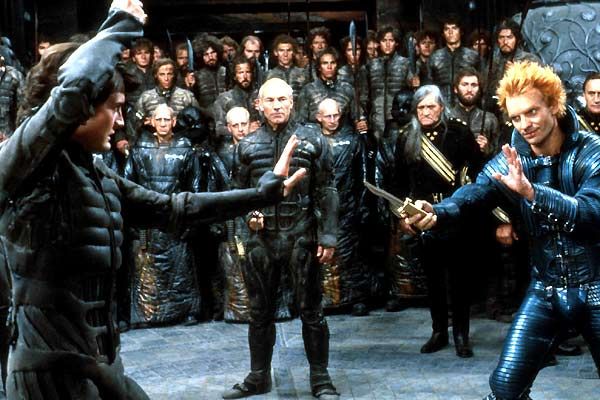Most films and screen versions have had some good acting and stunning visuals, moments approaching the book - but no dramatic adaptation has definitively clinched the tone of the written works.
The various film and TV adaptations of Dune and its sequels each have something to recommend them. Although the 1984 Lynch film is amazing, it was heavily edited, which makes it choppy at some points. It also diverged from the books slightly, out of necessity because Herbert's story is so big. But the cast was great and the planet's giant worms were convincing. The actresses playing Jessica (Francesca Annis), Chani (Sean Young) and Irulan (Virginia Madsen) had Lynch's preferred aching classical beauty, which added a quality of imperial grandeur to the project. It's that shimmering imagery of beautiful space empires and great noble houses clashing that I remember most about this film.
Virginia Madsen as Princess Irulan. Dune (1984). Image: De Laurentiis/Universal.
That imagery was picked up in two early classic videogames, Dune (1992: Cryo Interactive/Virgin Interactive) and Dune II (1992-1993: Westwood Studios). Both games featured pioneering designs for immersive gameplay and had ground-breaking graphics for the time. The now-obvious limitations of graphics were offset in the first game by its mesmerizing soundtrack. Dune as developed for the now defunct Commodore Amiga was famously scored by techno musicians Stéphane Picq (homepage here) and Philip Ulrich. Another first: the soundtrack came out on the CD, Dune: Spice Opera (1992). And Dune II is considered one of the first important games that featured real-time strategy.
Dune gameplay with its famous music (1992). © Cryo/Virgin.
More recently, two SciFi Network TV series adapted Dune (2000) and Children of Dune (2003). The latter series nearly jumped off the small screen with the portrayals of Alia Atreides by Daniela Amavia and Paul's and Chani's twin children, Leto II and Ghanima, respectively played by James McAvoy and Jessica Brooks.
Daniela Amavia's Alia Atreides was an Ibsen-like portrait of layers of familial power accumulated in one human being, which finally pulled her mind apart. Children of Dune (2003). Image: SciFi Network.
But again, there has been no near-perfect translation from the books to the screen. For example, I remember the Baron Harkonnen as being a remarkably complicated and subtle character in the book, which is difficult to convey alongside his bombastic villainy. So far, it hasn't been done.
The Atreides twins were well played by McAvoy and Brooks. Children of Dune (2003). Image: SciFi Network.
It's ironic that a science fiction epic like this, with its resonant metaphors surrounding dwindling resources in the desert, intermingled with jihadic miracles and religions, anticipates the rise of great monarchical power conglomerates. Herbert's great houses (Vernius, Harkonnen, Richese, Corrino) in his interstellar imperium hail back to classical times: House Atreides is supposedly descended "the mythological Greek House of Atreus. In Homer's Iliad, the brothers Agamemnon and Menelaus are dubbed 'the Atreides,' or, sons of Atreus." It's a development with which we are familiar: the tumultuous integration of the global economy matched by the evolution of super-states. At least the imperial families who can trace their heritage back to the classical era haven't shown up - yet.























This would be awesome - I LOVED the original Dune films!
ReplyDeleteI know! I loved the Lynch film and the video game. IMDB had a thread for awhile on the new Dune movie page that proposed a Dune cast that Hollywood execs might consider but would in fact be terrible ideas. I proposed among others: Angelina Jolie as Lady Jessica and Tom Cruise (eyepatch optional) as Duke Leto.
ReplyDelete